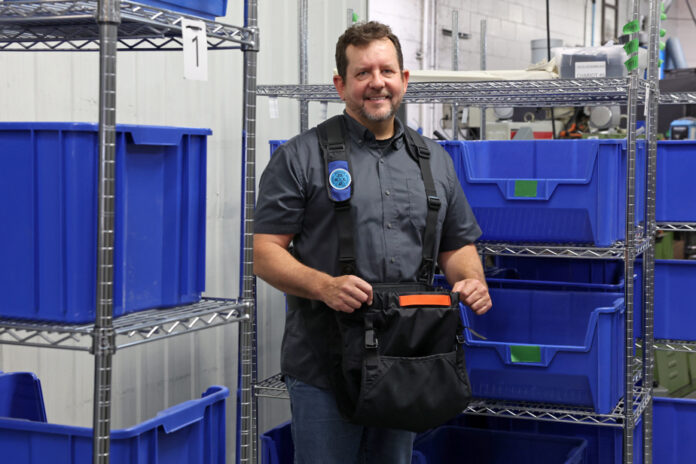To fulfill customer orders, employees in a large distribution center must walk the aisles of the warehouse to collect small items, which they place in the pocket of a simple cotton apron. Specializing in ergonomics, Synetik has designed and will manufacture a freelance harness for them, a sort of belly bag with shoulder straps and a belt, every detail of which has been thought out to facilitate their task.
Synetik was founded in 2004 by industrial designer Caroline Saulnier, who wanted to manufacture and market a small, versatile chair she had designed for workshop and factory work. The Joliette company has since developed a wide range of ergonomic chairs and stools for industrial use. Caroline Saulnier added ergonomic consulting and design services. It was during an intervention in one of the distribution centers of a large multinational company (which prefers not to be named) that the problem of the freelance apron was raised.
Synetik’s ergonomists and industrial designers have been working with the distributor for a year. An ergonomist analyzed the movements, movements and frequency of employee gestures on site.
They designed a harness whose wide straps and belt, adjustable to conform to various morphologies, are equipped with generous pads. “We do strength tests and we checked the pressure in the shoulders,” says Caroline Saulnier.
The right strap has a pocket where the employee can slip his retractable blade knife.
The belly pack is attached to the belt, which places the weight of it on the hips. The load therefore no longer weighs on the shoulders and spine, which reduces muscle fatigue.
A belly strap allows you to adjust the opening of the bag to let it gape at the desired size.
Once the order is assembled, the employee unloads the bag into a box or bin to prepare for shipping.
Two different bags can be attached to the harness: a simple, top-emptied bag or a bag that opens to dump its contents.
The latter is equipped with a device that allows you to unclip the front part of the pocket.
Simply pull on two small straps, which detach the loops from two hooks placed on either side of the bag. The front part of the pocket then extends completely downwards.
To close the bag, the user pulls the straps upwards, until the buckles grab onto the hooks by magnetism.
This system facilitates the fluidity and speed of employee movements, because “you have to design a product that will not lengthen their execution time”, argues Caroline Saulnier.
There you go, the case is in the bag.
The bag itself is made from breathable recycled fabric, supplied by a company in Granby.
“The last model has been authorized, the last stress tests are done”, underlines the president. Production is imminent. The manufacturing of the freelance harness will be entirely carried out in the Synetik workshops in Joliette.
“The project was deployed in Canada to start and they went to present it at a congress in the United States, informs Caroline Saulnier. They are very excited about the project. We already have requests for the United States. »
Synetik expects to deliver nearly 1,000 freelance harnesses to them in the first year. She wants to interest other companies and industries and offer the harness on her website and on Amazon.
Caroline Saulnier sees this project as an excellent example of Synetik’s integrated offering. The firm has about thirty employees in production and ten in consultation. It has just added two new ergonomists based in the Quebec City region to its team, to expand its consulting services there.















